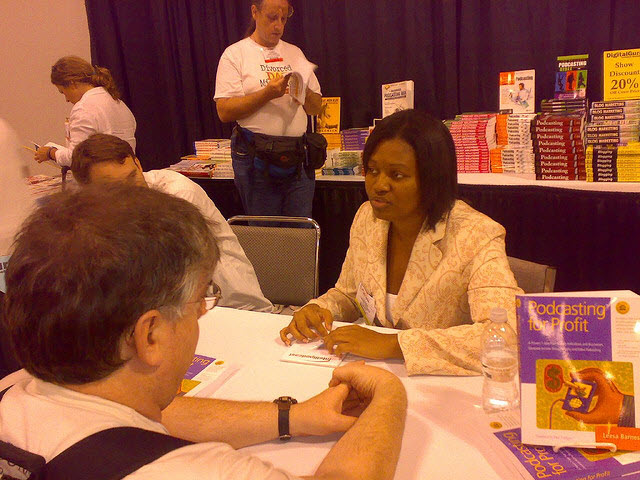 Liz Dreesen (seen on left), a surgeon and student at University of North Carolina in the United States recently wrote that she doesn’t support podcasting of her anatomy lectures because it means that students will no longer attend her class.
Liz Dreesen (seen on left), a surgeon and student at University of North Carolina in the United States recently wrote that she doesn’t support podcasting of her anatomy lectures because it means that students will no longer attend her class.
I hear this argument alot from educators. They’re worried that the podcast will come to replace the in-class experience, with students relying on them to get their information as opposed to physically being in class.
While I can appreciate Liz’s arguments, I also want to remind her that the goal should be to avail herself to the changing needs of her students. Inconvenience to a student can mean having to miss class due to illness, childcare, a death in the family or even stress. A video recording of Liz’s lecture will aid these students so that they don’t have to rely on 2nd hand information to still stay on top of the lessons.
The big fear that came out of Liz’s article is that she feels that students will just use the video podcasts to ” mute us or fast forward us when they feel we’re droning on too long.”
There are a couple of ways Liz can offer her lectures as a podcast and still have a full class every week. For example:
- Record your lecture, but don’t record the Q&A that follows.
- Record your lecture, but not the hands on surgical procedures. At that point, turn the camera away and only capture your voice.
In other words, make the video podcast so boring that students will use it as a backup and not as a replacement. That’s the way to provide convenience for students without sacrificing class attendance.


Looks like short-sightedness, lack of creativity and need for control aren’t limited to the corporate world when it comes to podcasting. Educators are plagued with the same problem.
You’d think the important thing is that the students learn the content. Give it to them how they want it. Let free-thinking adult students form the experience they need with the resources provided them. And yes this can include time-shifted content and maybe they don’t always need to be in class.
If you’re afraid of being edited (with the ffwd button) by the consumer, then make content that they won’t want to fast forward. There’s a solution for you.
I’ve ranted enough.
Ah Bryan, I can always count on you to articulate what I was trying to articulate. You have summed up quite nicely what Liz could potentially do with her podcast. Great job.
Liz is concered that studens will mute or fast-forward her if they think she’s droning on for too long.
Well, is she droning for too long? And if she is, then isn’t it she that needs to improve her lecturing?
Another option is to not have the podcast simply be the lecture itself. Maybe it could be supplemental material. For example, if her lectures are on Tuesday and Thursday, maybe she releases a pocdast every Friday with reflections on the two classes and questions from the students, and some talking points for the next class.
There’s so much potential here, but I think the key is not to think of it as a replacement of the experience of going to class.
Now, I don’t mean make it crappy. That’s not what I mean by making the podcast boring. But like Mastermaq said on his blog, the lecturer needs to make the podcast compelling enough that it still brings bums to the seats. Gives the student a sense that they’re missing something when they choose to watch the video podcast instead of going to class.
Like with a business podcast, you can’t give everything away in a free video podcast. I’m also not endorsing that you use trickery either. By boring, I simply mean that…oh brother, I’m not sure how to explain this. Okay, I’ll sleep on this and perhaps I’ll be able to articulate better in the morning.
Or maybe “boring” is the wrong word.